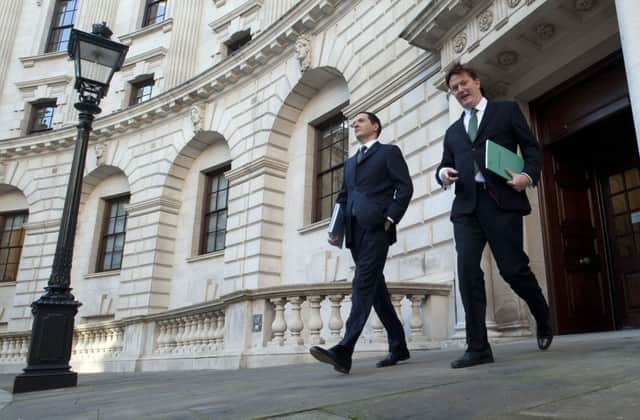Osborne’s statement at a glance


TAX
• Reform of residential property stamp duty so that rates fall only to that part of the property price that falls within each band - 0% in first £125,000 then 2% on the portion up to £250,000 then 5% up to £925,000, then 10% up to £1.5 million, then 12% on anything above that, saving £4,500 on average priced home.
• UK’s net payments to European Union to fall by about £1 billion this year and next year and decline in real terms over the next five years.
Advertisement
Hide AdAdvertisement
Hide Ad• Inheritance tax exemption extended to cover aid workers who die dealing with humanitarian emergencies.
• Hospice charities, search and rescue and air ambulance to be granted VAT refunds.
• New 25% diverted profits tax on multi-national profits generated in the UK and “artificially” moved out of the country.
• Changes to rules on bank profit offsets to raise almost £4 billion.
Advertisement
Hide AdAdvertisement
Hide Ad• Clampdown on aggressive tax avoidance to raise £2.8 billion.
• Charge for non-dom tax status to rise to £60,000 a year for those resident for 12 of the last 14 years and £90,000 for those in the country for 17 of 20 years.
• Annual charge on properties “enveloped” to avoid stamp duty to rise by 50% above inflation on properties over £2 million.
• Immediate reduction in oil industry supplementary charge from 32% to 30%.
Advertisement
Hide AdAdvertisement
Hide Ad• Air passenger duty for children under 12 abolished in May 2015 and for under 16s in 2016.
• Government to legislate to devolve corporation tax to Northern Ireland if the Northern Ireland executive shows it can manage the financial implications.
• People who die under 75 to be enabled to pass on annuities tax free.
• Limit on saving in New Isas to rise to £15,240 and Isas to be inherited tax free.
• National Insurance on young apprentices to be abolished.
Advertisement
Hide AdAdvertisement
Hide Ad• Income tax free personal allowance to rise to £10,600 rather than the planned £10,500 next year, giving wage boost of £825 a year.
• Higher rate income tax threshold to rise to £42,385 next year.
ECONOMY
• Office for Budget Responsibility GDP growth forecast for this year is 3%, then 2.4% in 2015, 2.2% in 2016, then 2.4%, 2.3% and 2.3% in subsequent years.
• OBR revises down inflation forecast “significantly” to 1.5% this year, 1.2% next year and 1.7% the year after.
Advertisement
Hide AdAdvertisement
Hide Ad• OBR forecasts deficit to fall from £97.5 billion last year to £91.3 billion this year, then £75.9 billion next year then £40.9 billion and £14.5 billion in subsequent years before reaching a surplus of £4 billion in 2018/19 and £23 billion in 2019/20.
• Deficit as percentage of GDP at 5% this year, falling to 4% next year, then 2.1% and 0.7% before moving into surplus of 0.2% in 2018/19 and 1% in 2019/20.
• Debt as a share of GDP 80.4% this year, peaking at 81.1% next year then falling to 80.7%, 78.8%, 76.2% in following years before reaching 72.8% in 2019/20.
EMPLOYMENT, BUSINESS and EDUCATION
• Half a million new jobs created over the last year, with numbers claiming unemployment benefit falling by 23% and young people on long-term jobless benefit almost halving.
Advertisement
Hide AdAdvertisement
Hide Ad• Unemployment forecast at 5.4% next year before settling at 5.3%.
• Regular earnings growth is now faster than inflation, at 4% for those in full-time work for over a year.
• OBR predicts wage growth above inflation for the next five years.
• Expansion of British Business Bank, extension for a further year in the Funding for Lending scheme for smaller firms and new tax break for orchestras and children’s television tax credit.
Advertisement
Hide AdAdvertisement
Hide Ad• R&D tax credit increased for small and medium companies to 230% and for large firms to 11%, while small business rate relief is doubled for another year.
• Inflation-linked increase in business rates capped at 2% and discount for shops, pubs and cafes increased by 50% to £1,500.
• Government-backed loans of up to £10,000 made available for all students undertaking post-graduate masters degrees.
INVESTMENT
• Mr Osborne confirmed additional £2 billion every year for the frontline of the NHS and a £1.2 billion investment in GP services paid for from foreign exchange fines.
• Employment Allowance of £2,000 to be extended to carers.
Advertisement
Hide AdAdvertisement
Hide Ad• Tendering for new franchises for Northern Rail and Trans-Pennine Express to replace pacer carriages with modern trains.
• Investment of £250 million in new advanced material science institute in Manchester with branches in Leeds, Sheffield and Liverpool.
• New sovereign wealth fund to invest proceeds from shale gas resources in the north, in the north of England.
PENSIONS AND EFFICIENCIES
• Public sector pay restraint in the next Parliament to deliver savings “commensurate” with the £12 billion achieved over the past four years.
Advertisement
Hide AdAdvertisement
Hide Ad• Commitment to complete public service pension reforms, saving £1.3 billion a year.
• Plan published for a further £10 billion of efficiencies in Whitehall, and Chancellor commits to raising at least £5 billion by cracking down on tax avoidance and evasion.
• Universal Credit work allowances to be frozen for a further year, tax credits to be cut when overpayments are certain and unemployment benefit to be ended for migrants with no prospect of work.
• Total welfare spending set to be £1 billion lower than Budget forecast and to continue falling as share of GDP.